1970s: Road Warrior Boomers
May 19, 2019
By AHNZ
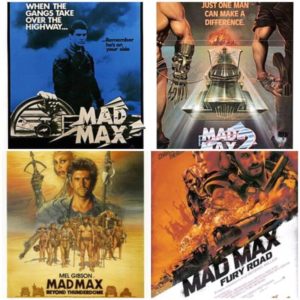 George Miller, film director and producer, was a young doctor in 1970s Australia. His work was full of crash victims, bloody young men who had been injured and maimed on Queensland roads. The pain, desperation, loss of limbs and general human carnage caused by speed and impact on Australian roads ate into George’s consciousness. But he had to repress it like all good medics in order to keep doing his job.
George Miller, film director and producer, was a young doctor in 1970s Australia. His work was full of crash victims, bloody young men who had been injured and maimed on Queensland roads. The pain, desperation, loss of limbs and general human carnage caused by speed and impact on Australian roads ate into George’s consciousness. But he had to repress it like all good medics in order to keep doing his job.
Doctor’s Repressed Horror Creates Art
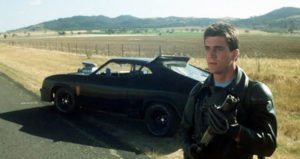
Out came the sublimated horror in film. I re-watched the Mad Max trilogy so I could view the 2015 instalment with maximum understanding. I needn’t have bothered as there was no connection and little value. Miller did, in this one, Fury Road, make his protagonist, Mad Max, a human blood bank which had not been done in prior films. It makes sense to have done so in keeping with the fact that these films project Miller’s experiences in the trauma ward.

The first film is certainly the greatest, resonating with and drawing on the loss of wife and child to road ‘accidents’ along with Max’s permanent leg injury. The racing, the crashing, the tearing off of limbs…. The film plotted the fruitless quest to keep a man in Dignity Culture law enforcement in a world gone mad with petrol-fuelled Honor Culture tribes.
Tina Turner was brilliant, so was her song, for #3: Thunderdome. The story arc for Max certainly was there for #2 but in the main it was cashing in on the post 1970s sentiment #1 had found. Max found redemption in Beyond Thunderdome, helping the children of this world reboot civilisation the same way Wolverine did in Logan (2017.)
Kiwi Carnage
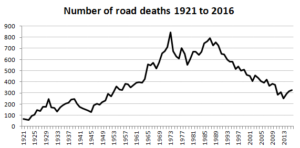 Although made for Australia, the films are part of New Zealand and Western history for what they show us about ourselves. Kiwis were going through the same Baby-Boomer-Gets-Wheels situation. The young Boomer men were detailing their cars, souping them up, crashing them, and killing one another while thinking what they were doing made them individuals and irresistibly cool.
Although made for Australia, the films are part of New Zealand and Western history for what they show us about ourselves. Kiwis were going through the same Baby-Boomer-Gets-Wheels situation. The young Boomer men were detailing their cars, souping them up, crashing them, and killing one another while thinking what they were doing made them individuals and irresistibly cool.
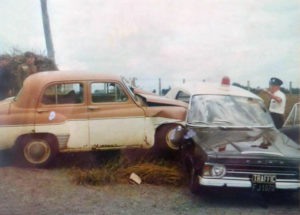 1973 was peak fatality and peak injury for population-weighted statistics over all our recorded history. In that year 843 people died on the roads with a reported 23385 injuries. Even with today’s population these number have never been surpassed. Nothing comes close until the next Honour Culture cycle in the 1980s.
1973 was peak fatality and peak injury for population-weighted statistics over all our recorded history. In that year 843 people died on the roads with a reported 23385 injuries. Even with today’s population these number have never been surpassed. Nothing comes close until the next Honour Culture cycle in the 1980s.
Not Everyone was Homicidal
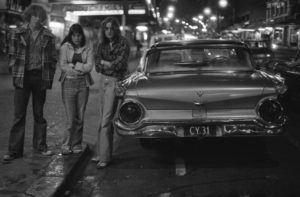 Here are some other car-culture New Zealanders who knew, or were themselves, the local inspiration for Miller’s Mad Max. Some of these guys and these cars survived and can be observed attending, for example, Elvis Presley birthday anniversary concerts that are still being held.
Here are some other car-culture New Zealanders who knew, or were themselves, the local inspiration for Miller’s Mad Max. Some of these guys and these cars survived and can be observed attending, for example, Elvis Presley birthday anniversary concerts that are still being held.
Some were just showing off without escalating to deathly speeds culminating in a trip to the emergency room.
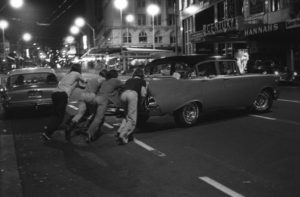
I suspect the people in these photos were just fooling around, perhaps enjoying their Elvis and Americana, and living to a ripe old age. The Mad Max set probably listened to different music and would not have allowed themselves to be photographed.
Out of the Wreckage
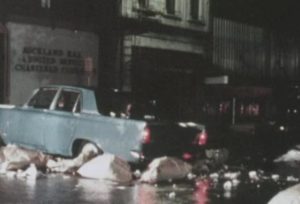 Road Warrior Boomers were, of course, also forgetting all about the future. The next generation were the ones they left behind, neglected. As in Beyond Thunderdome, GenX and Millennials are left to pick through the wreckage of the modern to find values Boomers refused to pass on. Because, sorry to say, after this 1970s phase of crashing cars it turned out that Boomers were just as good at parenting as they were at traffic safety…
Road Warrior Boomers were, of course, also forgetting all about the future. The next generation were the ones they left behind, neglected. As in Beyond Thunderdome, GenX and Millennials are left to pick through the wreckage of the modern to find values Boomers refused to pass on. Because, sorry to say, after this 1970s phase of crashing cars it turned out that Boomers were just as good at parenting as they were at traffic safety…
—
image ref. Road Deaths; Transport.gov
image ref. Noel Johnson; NZ car related street scenes 1950s-1980s, Facebook
Image ref. c.1978 Police car; NZ Police Museum photo; Facebook
image ref. Kevin Graham; NZ car related street scenes 1950s-1980s, Facebook
image ref. Scene from Queen Street (1980); NZ on Screen
Note: Mad Max (1979) was not legally viewed in New Zealand until 27 May, 1983! Ours was the dubious distinction of being the last English speaking country to see the film that started it all. Ref. Press (1983,) Papers Past
Note: I’m not sure the generation in question were Elvis fans. Might belong to an earlier group.
 Like Comment Share
Like Comment Share





